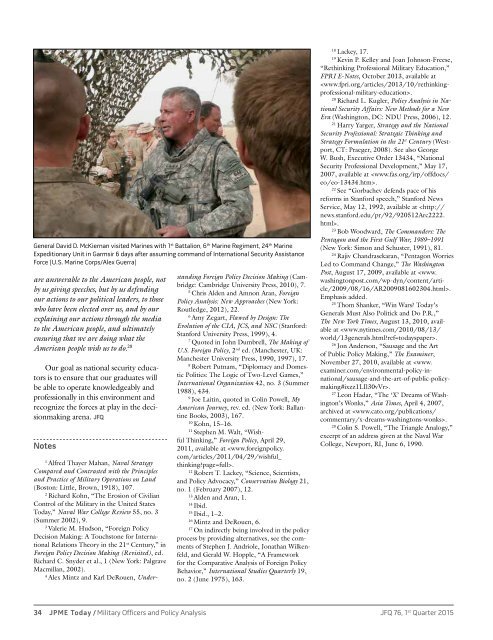jfq-76
jfq-76
jfq-76
Create successful ePaper yourself
Turn your PDF publications into a flip-book with our unique Google optimized e-Paper software.
General David D. McKiernan visited Marines with 1 st Battalion, 6 th Marine Regiment, 24 th Marine<br />
Expeditionary Unit in Garmsir 6 days after assuming command of International Security Assistance<br />
Force (U.S. Marine Corps/Alex Guerra)<br />
are answerable to the American people, not<br />
by us giving speeches, but by us defending<br />
our actions to our political leaders, to those<br />
who have been elected over us, and by our<br />
explaining our actions through the media<br />
to the American people, and ultimately<br />
ensuring that we are doing what the<br />
American people wish us to do. 28<br />
Our goal as national security educators<br />
is to ensure that our graduates will<br />
be able to operate knowledgeably and<br />
professionally in this environment and<br />
recognize the forces at play in the decisionmaking<br />
arena. JFQ<br />
Notes<br />
1<br />
Alfred Thayer Mahan, Naval Strategy<br />
Compared and Contrasted with the Principles<br />
and Practice of Military Operations on Land<br />
(Boston: Little, Brown, 1918), 107.<br />
2<br />
Richard Kohn, “The Erosion of Civilian<br />
Control of the Military in the United States<br />
Today,” Naval War College Review 55, no. 3<br />
(Summer 2002), 9.<br />
3<br />
Valerie M. Hudson, “Foreign Policy<br />
Decision Making: A Touchstone for International<br />
Relations Theory in the 21 st Century,” in<br />
Foreign Policy Decision Making (Revisited), ed.<br />
Richard C. Snyder et al., 1 (New York: Palgrave<br />
Macmillan, 2002).<br />
4<br />
Alex Mintz and Karl DeRouen, Understanding<br />
Foreign Policy Decision Making (Cambridge:<br />
Cambridge University Press, 2010), 7.<br />
5<br />
Chris Alden and Amnon Aran, Foreign<br />
Policy Analysis: New Approaches (New York:<br />
Routledge, 2012), 22.<br />
6<br />
Amy Zegart, Flawed by Design: The<br />
Evolution of the CIA, JCS, and NSC (Stanford:<br />
Stanford University Press, 1999), 4.<br />
7<br />
Quoted in John Dumbrell, The Making of<br />
U.S. Foreign Policy, 2 nd ed. (Manchester, UK:<br />
Manchester University Press, 1990, 1997), 17.<br />
8<br />
Robert Putnam, “Diplomacy and Domestic<br />
Politics: The Logic of Two-Level Games,”<br />
International Organization 42, no. 3 (Summer<br />
1988), 434.<br />
9<br />
Joe Laitin, quoted in Colin Powell, My<br />
American Journey, rev. ed. (New York: Ballantine<br />
Books, 2003), 167.<br />
10<br />
Kohn, 15–16.<br />
11<br />
Stephen M. Walt, “Wishful<br />
Thinking,” Foreign Policy, April 29,<br />
2011, available at .<br />
12<br />
Robert T. Lackey, “Science, Scientists,<br />
and Policy Advocacy,” Conservation Biology 21,<br />
no. 1 (February 2007), 12.<br />
13<br />
Alden and Aran, 1.<br />
14<br />
Ibid.<br />
15<br />
Ibid., 1–2.<br />
16<br />
Mintz and DeRouen, 6.<br />
17<br />
On indirectly being involved in the policy<br />
process by providing alternatives, see the comments<br />
of Stephen J. Andriole, Jonathan Wilkenfeld,<br />
and Gerald W. Hopple, “A Framework<br />
for the Comparative Analysis of Foreign Policy<br />
Behavior,” International Studies Quarterly 19,<br />
no. 2 (June 1975), 163.<br />
18<br />
Lackey, 17.<br />
19<br />
Kevin P. Kelley and Joan Johnson-Freese,<br />
“Rethinking Professional Military Education,”<br />
FPRI E-Notes, October 2013, available at<br />
.<br />
20<br />
Richard L. Kugler, Policy Analysis in National<br />
Security Affairs: New Methods for a New<br />
Era (Washington, DC: NDU Press, 2006), 12.<br />
21<br />
Harry Yarger, Strategy and the National<br />
Security Professional: Strategic Thinking and<br />
Strategy Formulation in the 21 st Century (Westport,<br />
CT: Praeger, 2008). See also George<br />
W. Bush, Executive Order 13434, “National<br />
Security Professional Development,” May 17,<br />
2007, available at .<br />
22<br />
See “Gorbachev defends pace of his<br />
reforms in Stanford speech,” Stanford News<br />
Service, May 12, 1992, available at .<br />
23<br />
Bob Woodward, The Commanders: The<br />
Pentagon and the First Gulf War, 1989–1991<br />
(New York: Simon and Schuster, 1991), 81.<br />
24<br />
Rajiv Chandrasekaran, “Pentagon Worries<br />
Led to Command Change,” The Washington<br />
Post, August 17, 2009, available at .<br />
Emphasis added.<br />
25<br />
Thom Shanker, “Win Wars? Today’s<br />
Generals Must Also Politick and Do P.R.,”<br />
The New York Times, August 13, 2010, available<br />
at .<br />
26<br />
Jon Anderson, “Sausage and the Art<br />
of Public Policy Making,” The Examiner,<br />
November 27, 2010, available at .<br />
27<br />
Leon Hadar, “The ‘X’ Dreams of Washington’s<br />
Wonks,” Asia Times, April 4, 2007,<br />
archived at .<br />
28<br />
Colin S. Powell, “The Triangle Analogy,”<br />
excerpt of an address given at the Naval War<br />
College, Newport, RI, June 6, 1990.<br />
34 JPME Today / Military Officers and Policy Analysis JFQ <strong>76</strong>, 1 st Quarter 2015




